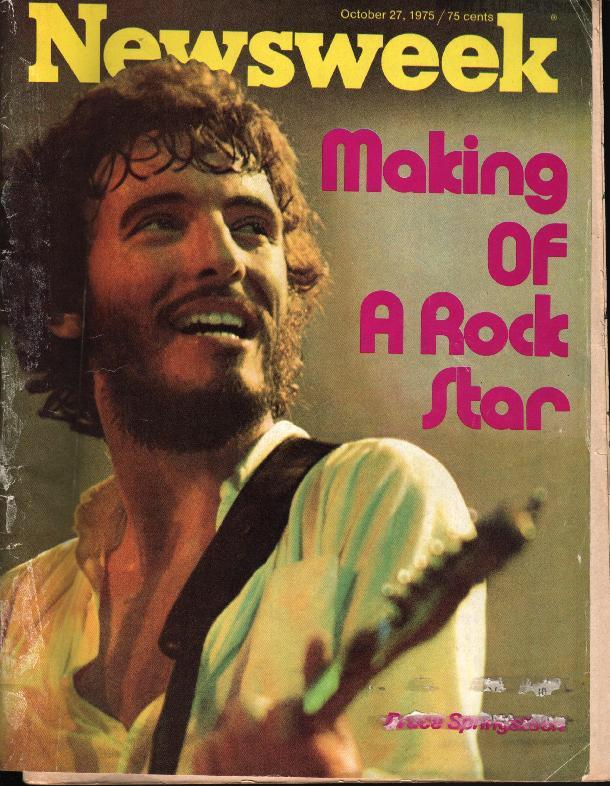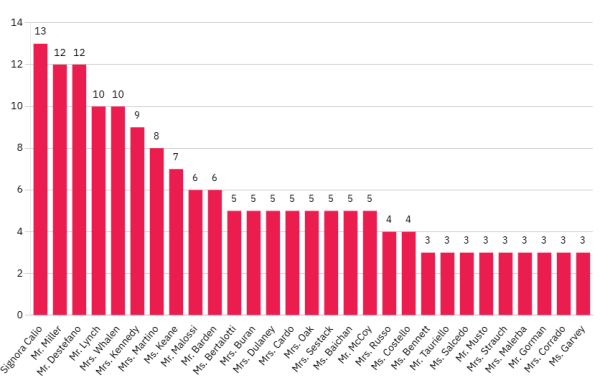Bruce Springsteen: Why You Should Care About an Aging Rock Star
Forty-two years ago, Bruce Springsteen released his debut album, and a legend was born “somewhere in the swamps of Jersey.” Springsteen, better known as “The Boss,” blew people’s minds with his Bob Dylan-esque sound and his raucous E Street Band as he made a name for himself in the early 70’s. Eighteen studio albums and seventy-one Billboard singles later, Springsteen and his band are still stealing the collective breath of diehard fans with their distinct sound. “The Boss” is a working class hero whose music uplifts Americans and people all over the world with his commanding lyrics, booming three hour live performances, and the cry of his dominant voice.
So why should teenagers care about this American icon? He’s not running onstage and stealing the mic from Taylor Swift. He’s not overdosing in Vegas. So why does he matter anymore? How can you possibly relate? Here’s a few suggestions:
1) You’ve had family issues: A child of two working class parents and growing up in the borough of Freehold, New Jersey was a struggle for young Springsteen. He did not have a great relationship with his father, and recalls, in one of his books, two things that were unpopular in his home: “one was me, and the other was my guitar.” In his later years, Springsteen admitted the struggle with his father allowed him to express himself even more through his music. The starting point of his music career was when his mother took out a $60 loan to buy young Bruce a guitar for his sixteenth birthday.
2) You play music: By the late 1960s, Springsteen was spending most of his time in Asbury Park on the New Jersey Shore, playing in several different bands while he introduced audiences with his never-before-heard sound. It was there that he first met the musicians who would later form his E Street Band. Springsteen met a number of the members of the band in a series of bars down in Asbury Park. According to Biography.com, Springsteen acquired his nickname, “The Boss,” because he had a habit of collecting money earned during shows and then distributing it evenly among his bandmates. In 1972, Springsteen scored a record deal with Columbia records and began his decades of success.
3) You appreciate good music: After two not-so-successful albums in 1973 and just over a year in the studio, Bruce Springsteen released his most famous album, Born To Run. This album peaked at No. 3 on the Billboard 200 in 1975, and finally allowed Springsteen to make it into the limelight. On this album, “The Boss” reached deep into his soul and created one of the most lyrically poetic albums of his career. There are absolutely no holes in this album. “Born To Run,” “Backstreets,” and “Jungleland” are the top three songs on the record. Springsteen’s next album, Darkness on the Edge of Town, released in 1978, emphasized themes of lost love, depression, and low-wage suffering. Because of various lawsuits, this album took three long years to come out. Springsteen has said in interviews that he didn’t want his most successful album to be the end or want his career to go down, or as Bruce would say, “on a downbound train.”
4) You go to concerts: That same year, Bruce Springsteen and the E Street Band went on a huge tour, playing dozens and dozens of shows across America, bringing the overwhelming energy of the band into the eyes of newfound fans. Around this time, Springsteen began telling onstage stories about the songs he’d perform to make them more relatable. Springsteen painted a picture in listeners’ minds prior to his enthralling performances; not too many artists have ever dared to do this…most would probably get booed off stage.
5) You enjoy prolific artists: The 1980’s treated Bruce Springsteen extremely well, as he released four albums (three studio, one live) and having overwhelming, history-making success with them. First, “The Boss” released The River. A four-sided album (2CDs), with a total of twenty hit tracks made this record one to be reckoned with. The album has been regarded as “the encyclopedia of rock n roll,” according to rollingstone.com, because it touches upon a series of topics including hard times for the working man of the United States. According to Springsteen, “Its title song is a song I wrote for my brother-in-law and sister. My brother-in-law was in the construction industry, lost his job and had to struggle very hard back in the late 70s, like so many people are doing today. It was a record where I first started to tackle men and women and families and marriage.”
6) You sometimes enjoy depressing music: Nebraska, Springsteen’s next album, in 1982, was his lyrically deepest of all. Sitting in his New Jersey bedroom with a four-track cassette recorder, an old rocking chair, dozens of songs which were supposed to be recorded for The River, and no E Street Band, Springsteen recorded a parched, risky album in just one session. Later, Springsteen did not like the sound of Nebraska with the band, so he decided to put it out as is. Three words to describe this album are “dark” and “brutally honest.”
7) You think rock megastars are worth exploring: Springsteen’s explosion into rock superstardom came in 1984 when he released Born in the U.S.A. With a record seven singles hitting the top 10 of the Billboard Charts—including “Glory Days,” “Dancing in the Dark,” “Born in the U.S.A.” and “Cover Me”—the album would become one of the best-selling records of all time and made “The Boss” a household name all over the globe. This album did not include the dark, deep sound of late-70s Springsteen, though. Songs on the album were more energetic, upbeat, and pop-sounding. The fans loved the change; by 2012, Born in the U.S.A. had sold 30 million copies worldwide, making it one of the best-selling albums ever.
8) You appreciate artists who care about causes: With Born in the U.S.A blowing people’s minds all around the globe, Bruce Springsteen was enjoying Michael-Jackson-level superstardom. As famine devastated Africa, famous music producer Quincy Jones assembled a group of the most famous musicians in the United States to perform on a single dedicated to those in need. Springsteen was one of them, along with Michael Jackson, Lionel Richie, Bob Dylan, Stevie Wonder, Cyndi Lauper, and Ray Charles–ever heard of them? Springsteen put his roaring voice onto the hit and sang with pride. Four months after the release of “We Are the World,” USA for Africa had taken in almost $10.8 million for the hungry in Africa. All of the profits from records and merchandise sold went directly to the people in need.
9) You like artists who are real human beings: After the success of Born in the U.S.A. returned to Earth about a year after its tremendous run, fans’ mouths were watering again, anticipating another Springsteen masterpiece. In 1985, Springsteen briefly married actress Julianne Phillips. The two officially divorced in 1989. Springsteen’s 1987 album Tunnel of Love described some of his crippling unhappiness from the failing relationship. Shortly after, Springsteen formed a relationship with backup singer and fellow New Jersey resident Patti Scialfa during the Tunnel of Love tour. Springsteen moved in with Scialfa, and they had two children together before marrying in 1991. Their third and last child was born in 1994. Springsteen and Julianne Phillips’ breakup inspired several classic Springsteen songs, including “Brilliant Disguise.”
10) You recognize that huge success can only come from huge failure: Fast forward to the 1990’s. Springsteen released seven albums (three studio, three compilation and one live), including the most successful of the decade, The Ghost of Tom Joad in 1995, without the E Street Band. This album, like Nebraska, was very dark. This record was lyrically inspired by the Pulitzer Prize–winning novel The Grapes of Wrath. Prior to this album, however, “The Boss” released two albums on the same day in 92’, Human Touch and Lucky Town…and this venture led to far less success commercially. In a 1992 interview with Rolling Stone, Springsteen claims, he “realized the two albums together tell one story. There’s Tunnel of Love, then there’s what happened in between, which is Human Touch, then there’s Lucky Town.” Springsteen later recalls thinking, “‘Well, hey—Guns n’ Roses! They put out two albums, maybe I’ll try it!’” It did not go well. Would this mark the end of an already stellar career?
11) You enjoy comebacks: By 2001, Springsteen found himself an aging legend releasing music for the love of it, not for the breathtaking record sales. In 2002, Springsteen released his first studio effort with the full band in 18 years, The Rising. The album, mostly a reflection on the September 11 attacks, was a critical and popular return to form. The record became Springsteen’s best-selling album of new material in 15 years. Around the time of The Rising, a new song, “American Skin (41 Shots)”, about the police shooting of Amadou Diallo, created controversy in the media. This one song led a small number of fans to turn their backs on Springsteen and his music. Post 2002, Springsteen released seven studio albums: Devils & Dust (2005), We Shall Overcome: The Seeger Sessions (2006), Magic (2007), Working on a Dream (2009), The Promise (2010), Wrecking Ball (2012) and High Hopes (2014). Releasing seven albums in a nine-year period is extremely impressive and hasn’t been done by too many artists, especially those with the massive popularity of “The Boss.” To end the decade, Bruce Springsteen played in front of the largest crowd of his career: Super Bowl XLIII in Tampa, Florida. Springsteen and the E Street Band rocked the nation while on stage, demanding viewers to “step away from the guacamole dip, put down the chicken fingers, and turn the TV up,” as he and the band blew the minds of Americans. The 2000’s concluded with Springsteen being named one of eight “Artists of the Decade” by Rolling Stone magazine. This was, of course, 30 years into his career.
12) You appreciate longevity: As for the present day, Bruce Springsteen, 66, can be seen popping up where it all began in Asbury Park, playing small bars, jamming out with the locals who’ve adored his music for years. In the summer of 2015, Springsteen and the E Street Band performed “Land of Hope and Dreams” and “Born to Run” on the final episode of The Daily Show with Jon Stewart, as Stewart’s final ‘Moment of Zen.’ Springsteen remains as culturally relevant as ever.
13) You enjoy greatness: Bruce Springsteen is not only known as one of the most successful musicians there has ever been; he also has with the most loyal fans in the world. Hearing Springsteen’s megahits “Born to Run,” “Born in the U.S.A.,” “Dancing in the Dark,” and “Glory Days” constantly being played on the radio decades after their release, allows a new generation of youth to appreciate the music of “The Boss” and to dig into his archive of lyrical poetry to find themselves through music.
Why should any teenager be interested in Bruce Springsteen, a man who could be his grandfather? Firstly, music is forever once it’s recorded. Secondly, if you can’t find at least one reason why in the preceding list of THIRTEEN, you should be ashamed of yourself. As comedian, writer, producer, director, actor, media critic, and former television host Jon Stewart would say, Springsteen goes all out in everything he does, “[emptying] his tank for his family, for his art, for his audience, for his family, and for his country.”

Senior at Bethpage High School, Mikey Domagala is a third year journalism student who enjoys it very much. Mikey runs his self-created NBA Buzz Facebook...






